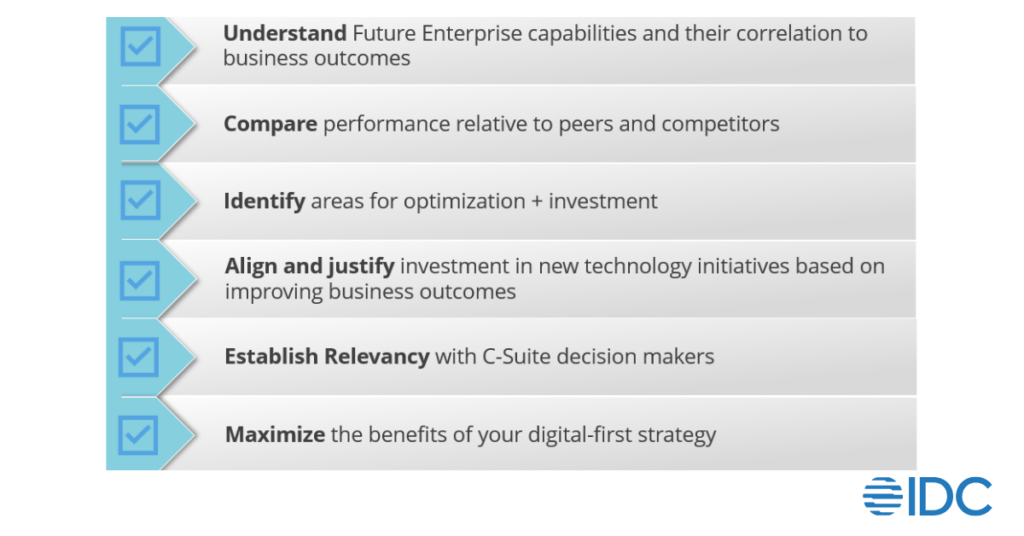Enterprise leaders now see digital technology and capabilities as foundational to innovate and succeed in the digital business era. However, as enterprises continue to navigate economic uncertainty, we are seeing a greater emphasis on achieving clear business outcomes from technology spending.
The growing complexity and pervasiveness of technology within enterprises is also driving expectations for faster time to value. As a result, IDC sees a greater need for clarity on prioritizing technology investments, resource allocation and insight into achieving business outcomes.
These issues are far from only being affiliated with IT; they now extend upward into the remit of the C-suite and impact all functional areas; 44% of CEOs have told IDC they need help with their digital business strategies. Moreover, lack of skills both within the C-suite and across the organization remains a key hurdle to achieving business outcomes from their digital initiatives.
Unveiling IDC’s FoX Scorecard Unique Value Proposition
One of the tools IDC believes will be instrumental in enabling business and IT leaders to navigate these obstacles is the IDC Future of “X” (FoX) Scorecard. The FoX Scorecard provides IDC clients with proprietary data and research to:
- Understand Future Enterprise capabilities and their correlation to business outcomes.
- Compare performance relative to peers and leading enterprises.
- Identify areas for resource and process optimization and investment.
- Implement recommendations from best-in-class organizations.
The FoX Scorecard methodology brings together the insights from our worldwide FoX analysts who have a deep understanding of the capabilities required to become a Future Enterprise. With the analysis expertise from IDC’s quantitative survey team:
- The FoX research framework explains the processes, organizational structures, and enabling technologies that empower enterprises to achieve their top business goals.
- The FoX Scorecard survey data identifies the investments, readiness, and performance across diverse enterprises across the globe.

For example, IDC’s Future of Work Agenda research reveals that organizations are struggling to implement the right balance of on-site and flexible work practices, understand what the best practices are to maintain company culture and how automation can make employees more productive.
Learn from Leading Organizations
The recently published IDC Future of Work Scorecard compares which approaches and technology deployments differentiate “Leading” enterprises from their peers. For example, best practices in hardware, software and services investment, driving increased operational efficiency, improved employee productivity and cost savings. These improvements arise not simply because of a single investment or deployment. They occur across key areas of work augmentation that in turn have an impact on work culture as it evolves in office, remotely and in spaces in between. At the most advanced level, enterprises that lead the culture, space, and augmentation pillars quickly embrace work transformation and new ways of working.
IDC’s analysis reveals that only 11% of worldwide enterprises are at the “Leading” stage. KPIs such as employee and customer satisfaction, quality scores, improved skills-levels, innovation and task-based metrics are important to these Leading enterprises. The Scorecard shows the stark measurable differences in positive business outcomes achieved by Leading organizations compared to all others – especially those that are nascent in their work transformation journeys. The gap between the Nascent and Leading enterprises points to areas of improvement.
Another example comes from IDC’s Future of Connectedness agenda program. The Future of Connectedness Scorecard analysis reveals that just 8% of enterprises are at the Leading stage, highlighting the connectivity technology areas of investment that most enterprises need to accelerate innovation. The insights from this Scorecard identify areas for optimization and investment across three capabilities: (1) Connectivity Transformation, (2) Services Enablement, and (3) Contextual Experiences. The results show the largest gap between the Nascent and Leading enterprises today is in their ability to use real-time insights to improve business outcomes.
Relevance to the Most Pressing C-Suite Agenda Items
Our 2023 Global CEO survey revealed that economic pressures top the list of risks to organizations. This underscores the need to measure the outcomes from any business investments, including technologies, services, and new hires. The most successful enterprises in the digital business era will be intentional about their investments. Using a fact-based approach to decision-making is what IDC FoX Scorecards are designed to offer.
The connection to business outcomes is what really makes the Scorecard methodology so relevant in today’s economic climate. IDC has built a standard approach to measuring business value across all our research domains. Scorecards are being rolled out across the following IDC research programs this year:
- Future of Operations
- Future of Trust
- Future of Customer Experience
- Future of Enterprise Intelligence
- Future of Connectedness
- Future of Industry Ecosystems
- Future of Digital Infrastructure
- Future of Work
- Worldwide Digital Business Strategies
Technology Suppliers are Part of the Equation
While the FoX Scorecards are designed to help end-user organizations, IDC believes that success will come when enterprises work closely with their trusted technology and service providers to advance their capabilities. The ongoing challenges facing the C-suite create an opportunity for suppliers to deliver targeted solutions and services to help enterprises drive business outcomes.
In an increasingly crowded and competitive tech industry, we expect the winning tech companies and services firms to finely tune their offerings and engagement model to empower enterprise customers to achieve business outcomes. Becoming a trusted advisor means being engaged with customers, helping C-suite and group leaders identify strengths and shortcomings, and demonstrating the benefits of improvement from accelerated technology investment.
Ultimately, when the economic picture begins to turn more universally positive, enterprise leaders will remember and reward the vendors that were there to help them during challenging times.
Summary: If You Don’t Measure It, You Can’t Improve It
During this period of economic uncertainty, a time when inflation is high, geopolitical conflict threatens supply chains, and qualified workers are in short supply, enterprise buyers are seeking faster time to value and quantifiable business outcomes from their tech investments. IDC FoX Scorecards will serve as valuable tools for IT and business leaders, aiding them in prioritizing and optimizing technologies and capabilities that can maximize business outcomes. And for IT suppliers, FoX Scorecards will be instrumental in demonstrating and measuring the value of their technology solutions.




